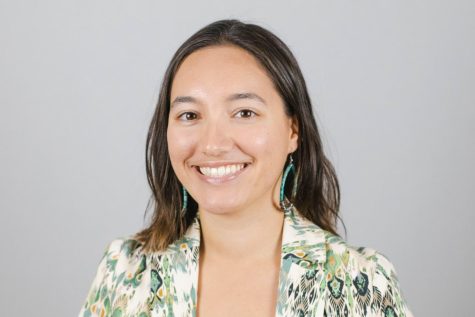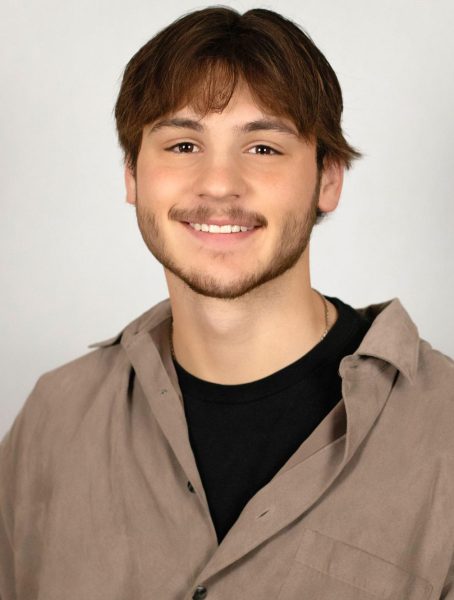Who is Kerri Schuiling?
An in-depth look into the life of NMU’s interim president
April 15, 2022
Kerri Schuiling didn’t plan on becoming NMU’s interim president when she graduated from high school in Grand Rapids. She hardly even planned to attend college at all.
As a first-generation college student, Schuiling wasn’t even aware Northern existed until her parents encouraged her to attend NMU’s nursing school instead of a nurse trade school.
“My grandmother was a nurse and I had wanted to be a nurse ever since I can remember … I wanted to go to Hackley Hospital School of Nursing. That was my big goal,” Schuiling said. “My mother was like, ‘You are not going to a trade school. If you’re going to be a nurse, you need a degree.’”
Schuiling followed her parents’ advice and moved to Marquette in 1969 where she met some of her lifelong friends. Many of the people she met were from the U.P. and showed her what it was like to be a Yooper.
“The best friends and neighbors I had were from Marquette or Negaunee or Ishpeming and I don’t know how I was lucky enough to have that happen, but that’s how I grew to love the U.P.,” Schuiling said. “Friends that had camps … I remember back in the day we’d go out there and swim around in our underwear and we would have a packet of Kool-Aid and bologna sandwiches and we just dip the pitcher in the lake and pour the Kool-Aid in. I mean that’s how fresh the water was.”
Schuiling was encouraged by her instructors at Northern to continue her education and get a master’s degree, but Schuiling and her friends decided to first do some traveling after they graduated. On a road trip from Grand Rapids back to Marquette, they stopped in Petoskey, Michigan and impulsively decided to interview for a job at the local hospital.
“We were on our way driving up to Northern and we went through Petoskey and we saw that beautiful Walloon Lake and we said ‘now this looks like a really cool place.’ We stopped at the hospital, interviewed, got a job,” Schuiling said. “We got a little tiny cottage on Walloon Lake, left some of our luggage there and went up to Northern.”
The hospital they got a job at on-site was Little Traverse Hospital where Schuiling worked for a year as a staff and charge nurse.
“A lot of my career has been kind of serendipitous. So I graduated and nursing is one of those wonderful professions where you have lots and lots of options and lots of job opportunities,” Schuiling said. “So I have to be honest and tell you I’ve moved once in my entire life for a job, otherwise I moved to where I wanted to live and looked for a job.”
In 1974, NMU started a two-year nursing degree program at the St. Luke’s School of Nursing. They were looking for an obstetrics instructor and one of Schuiling’s old nursing professors reached out to her with an offer for the position.
Schuiling accepted the position and moved back to Marquette to teach for two years. She was only 23 years old when she started teaching and hasn’t stopped since.
She continued to teach in Grand Rapids where she worked at the Butterworth Hospital School of Nursing and was given the opportunity to learn how to be a nurse practitioner. She was only the third person to be given nurse practitioner credentials in the state of Michigan.
“You look at my history and you’ll see it’s like I pushed a lot of boundaries, but at the time it just made sense to me,” Schuiling said.
She continued to push boundaries in the world of midwifery as well. She wanted to become a hospital midwife, which was largely unheard of at the time but could not find accessible programs in the area. She instead decided to pursue her master’s degree in advanced maternity nursing at Wayne State while continuing to teach nursing in Grand Rapids. She was encouraged by those around her to attend medical school, but Schuiling knew her calling was in nursing and childbirth.
After discovering a distance-learning midwifery program by accident one day, she immediately applied and became a certified midwife.
“I remember sitting [in the hospital] and there is this publication. It’s not a journal or anything like that, but it’s called Childbirth Graphics. They sell equipment and things like that to teach people,” Schuiling said. “So I’m looking through that and there is this little tiny ad and it talked about the first at-distance midwifery program in the United States. It was a pilot project funded by Pew National Trust. I called them up and I just had this absolutely fabulous experience.”
She was able to continue working and teaching in Grand Rapids while in the distance midwifery program. Schilling completed her clinical work requirements at Butterworth Hospital where her supervisors had to create midwife credential rules from scratch for her to get her certification.
At the same time, she was completing her certification, Schuiling had three children and was a single mother.
“I was in midwifery school when their dad left and I was just grief-stricken. I didn’t know what to do. I was scared to death,” Schuiling said. “I had three under the age of three and I remember talking to this wonderful woman … and she was very empathetic. And then she said, ‘Okay, well, what you need to do is get your act together because more than ever, you need to finish this program now.’”
Schuiling completed the program with help from friends who provided extra care for her children while she finished her certification. Despite all the work she was doing, Schuiling was determined to be there for her kids as well.
“When I was at school, I was doing schoolwork. When I was home, I didn’t get a lot of sleep, but when I was with my children, I was with my kids,” Schuiling said. “I didn’t miss practices. I attended to what was going on, but I also thought it was good for them to see a strong woman. I really felt that very strongly.”
After her completion of the midwifery program, Schuiling moved to Boulder, Colorado for a fresh start.
“Early midwifery, especially in those days, was kind of rocky,” Schuiling said.
She ended up moving back to Michigan after a few years and commuted back and forth between Grand Rapids and Kalamazoo. She worked at Bronson Methodist Hospital in Kalamazoo which was the largest midwifery practice in Michigan at the time and primarily cared for underserved women.
“Most midwives I know, and I know a lot of them, there’s a very big basis for providing care to women who might not get good care otherwise,” Schuiling said. “I would say the inclusiveness of midwifery is very near and dear to our hearts.”
During her time at Bronson’s, Schuiling started a research project looking at partnerships between midwives, perinatologists and obstetricians. She reached out to other nursing friends who helped her design the project and move forward with the research.
“I only had a master’s degree so I knew a little bit of statistics but didn’t know how to do design and all that,” Schuiling said. “We had some good findings so then I went to do the next step and [my friend] said, ‘you need to go back to school and you need to get your Ph.D.’”
Despite being encouraged to get her Ph.D., Schuiling didn’t entertain the idea seriously until the University of Michigan unveiled its Ph.D. program in women’s health. She was part of the first cohort in that degree track in 2003 when she was in her mid-40s.
“There were 12 of us [in that cohort]. I think eight or 10 of us were midwives and from all over the world,” Schuiling said. “It was an eclectic group and we just bonded, it was wonderful.”
Schuiling completed her Ph.D. research on women’s health and comfort during labor. While she was writing her dissertation, she was asked to teach obstetrics at Northern and moved her family back up north.
“The kids and I had visited every year up here to visit good friends. I told the kids and we sat down and my husband and I said ‘it’s up to you. I would love to move back to the U.P. I think it would be good for all of us,’” Schuiling said. “The kids were all for it. They missed Grand Rapids but they acclimated relatively quickly.”
After starting to teach in the College of Nursing, Schuiling was asked to become the interim department head. She was not sure she was going to like the position but she accepted the job anyway and helped start many programs including a collaborative doctorate of nursing practice degree with Oakland University.
“As I got into it, I did enjoy it. I think I enjoy administration because I have the opportunity to interact with a lot of people,” Schuiling said. “It’s problem-solving so I end up using a lot of my nursing skills.”
However, at the same time she was associate dean and director for the School of Nursing, she was completing her Ph.D. dissertation. When a publishing company reached out to her to write a book on women’s health, Schuiling declined until she was able to devote more time to the project.
When she did have time to write a book, she collaborated with one of her previous students and teaching partner, Frances Likis, to publish “Women’s Gynecologic Health” in 2005.
“Both of us were so frustrated. We could not find a book that worked. Too many of them were medical [and] we felt that they pathologized a lot of normal physiologic occurrences in women, like [insinuating] menopause was bad,” Schuiling said. “We really wanted to focus on wellness and prevention and keeping women at the center of things.”
This was the first book either of them had written and they reached out to other nurses to help them write specific chapters. Since they discovered commissioning illustrations were too expensive for their project, Schuiling’s mother drew the diagrams and illustrations for the first edition.
They published two more editions of the book in 2016 and 2020 and received a Book of the Year award for their work from the American Journal of Nursing in 2022.
“Each succeeding book would get bigger and we put more into it,” Schuiling said. “We were the first to really starting to devoting chapters to lesbian health because obviously, women with women partners come in and they don’t need all the tests that somebody with male partners needs.”
The third edition of their book also included information on transgender health and acknowledged the need for more inclusive language in the medical field.
“In almost every chapter, there is an acknowledgment that we were venturing into this area and we recognize that the language is evolving, and we’re sure that by a certain date, that’s not what would be used,” Schuiling said. “We also provided an explanation for why we used the studies that we used or why we used the terminology that we used.”
In the years following the publication of the first edition of “Women’s Gynecologic Health,” Schuiling held positions of associate dean of the School of Nursing at NMU, dean at the School of Nursing at Oakland University and dean of the College of Health Sciences and Professional Studies at NMU.
In 2015 she was asked to apply for the provost position at NMU and served as the provost and vice president of academic affairs for eight years.
During that time she helped establish the first cold weather Forensic Outdoor Research Station at NMU, the medicinal plant chemistry program, the NMU Center for Rural Health and SISU: The Innovation Institute. She was planning to retire in December 2021 but was asked to step in as interim president on Oct. 1 after former President Fritz Erickson was removed from his position.
“[The Board of Trustees] asked me if I would consider being the interim president and I called my family and talked to my kids about it,” Schuiling said. “They were all very supportive and said, ‘if you’re interested, go for it.’ I talked to a lot of faculty, and a lot of staff. I thought about it a lot.”
For Schuiling, the role as NMU’s interim president is not a long-term one. She hopes to pass the position to someone in the fall and be able to spend more time with her friends and family.
“Family for me is very important. The kids, they come home when they can and everything but I miss them terribly and I really miss my grandchildren,” Schuiling said. “My big decision is once I’m retired, will I stay here? My children come home and I visit them, but they like having me here because then they come home and then they have a spot to go out and see all their friends. They are still a tremendously important part of my life.”
As she finishes up her final semester here at Northern, Schuiling hopes to create a foundation for the next president to build upon and create positive changes for the future of NMU.
“I am definitely interested in working really hard to provide a good on ramp for the new president,” Schuiling said. “I also very much believe that our university needs to embrace change. We need a change agent in here.”


























